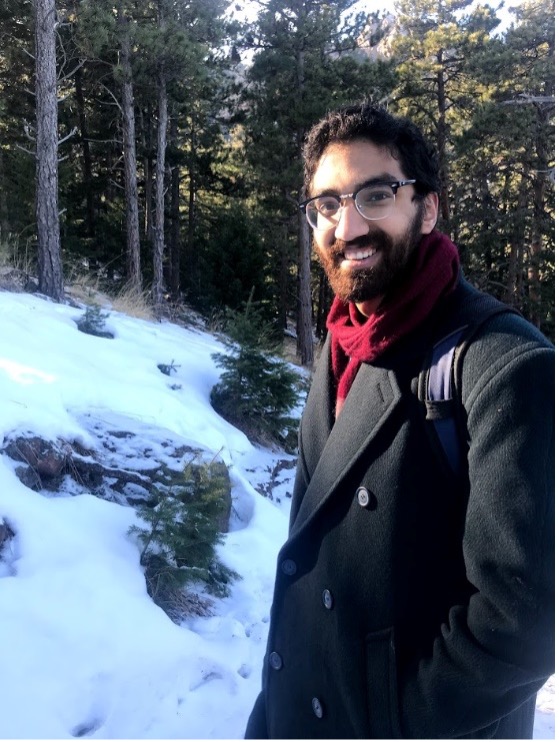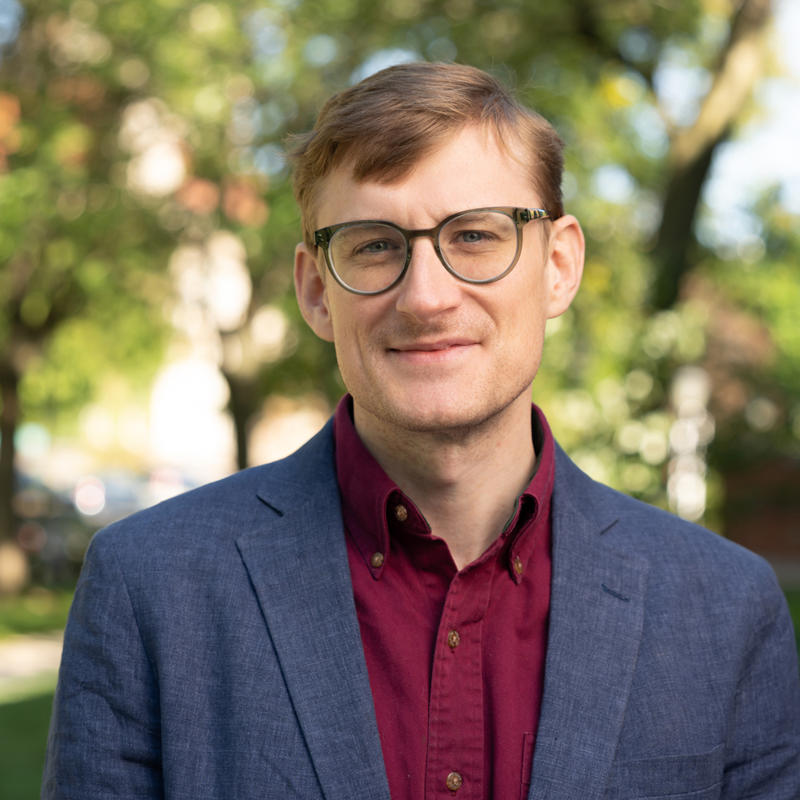
Biography:
Miguel C. Fernandes is a Ph.D. candidate in the History Department at the University of Chicago. His research interests include medieval European cultural and cognitive history, visual culture and materiality, media and technology, and the Iberian Peninsula. He holds an M.A. in Medieval History from the Universidade Nova de Lisboa (FCSH) and a B.Sc. in Applied Mathematics and Computation from the University of Lisbon (IST).
Project Title: Diagramming Hands: cognition, computation, and cross-modality in the Middle Ages
Abstract:
Diagrams have shaped the creation and circulation of knowledge for centuries, using space, color, and even the human body. Particularly in medieval times, diagrams often engaged not just the eyes but also the hands through touch and gesture. However, whereas the visuality of diagrams is a well-mapped field, the crucial role of the human body within diagrammatic cognition remains overlooked. Indeed, the sensory and motor systems of the body have a profound influence on our perception, memory, and thinking. My project addresses this question by situating medieval diagrams at the crossroads of visual, verbal, tactile, and kinesthetic senses. I argue that diagrams were dynamic, embodied, and multisensory interfaces, that enhanced memory and facilitated sophisticated thinking and problem-solving. By integrating history, cognitive science, computation, and art history, my research spotlights understudied sources like finger-counting diagrams and the Aristotelian pons asinorum, giving special consideration to educational environments such as monastic schools and universities. While my primary focus is on Latin Europe during the High Middle Ages (ca. 1050 – 1350), I also explore broader contexts, including Arabic, Greek, early medieval, and early modern source materials. Ultimately, this project aims to contribute to discussions on embodied cognition and premodern visual and material cultures.

Biography:
Megan MacGregor is a joint PhD Candidate in Anthropology and the Conceptual and Historical Studies of Science (CHSS). Her research is situated in the anthropology of science, technology, and medicine, and is broadly concerned with how biomedical knowledge production comes to characterize health and illness. Her dissertation project uses multisited ethnographic and archival methods to explore how the microbiome gets produced as a scientific, therapeutic, and discursive object.
Project Title: Modern Microbiomes: Dysbiosis, Health, and Therapeutics in Global Microbiome Science
Abstract:
Genomic methods of understanding microbes as ecosystems have generated the concept of the microbiome, a term that typically refers to the combined microorganisms within a given environment—often the human body. Increasingly, microbiome scientists argue that out-of-balance, or “dysbiotic,” microbial ecosystems result in a range of metabolic, developmental, and immune disorders associated with “Westernization” or “industrialization.” These arguments posit that modern life—including processed and low-fiber diets, more time indoors, and antibiotics—threaten biodiversity not only in external environments, but also the microbial environments within people’s bodies, and that this reduced microbial biodiversity affects human health. Using mixed ethnographic methods, my study examines how scientists in the United States and Mexico understand, map, and diagnose healthy and unhealthy microbiomes, asking how they locate and narrate modernity and industrialization in human bodies. As transnational and globally-oriented scientific research increasingly defines microbiome science among other scientific disciplines, it is crucial to understand the transnational processes through which scientific knowledge circulates. By engaging ethnographically with the scientific idea of “dysbiosis” in multiple perspectives, this study will shed light on how ideas about race, nation, and global power dynamics inform understandings of industrialization, modernity, and the relationships between unstable modern environments and human health.

Biography:
Ksenia Podvoiskaia is a PhD candidate in History at UChicago. She is a Canadian transplant and enjoys knitting, long walks to the Point, and hanging out with her cat, Pumpkin. Before returning to academia to study the history of teaching, she attended teacher's college at Queen's University in Kingston Ontario.
Project Title: Inventing the Modern Schoolteacher: Teacher Training in the Early Nineteenth Century British Empire
Abstract:
Why did the British state assume responsibility for teacher training in Victorian Britain? My research examines nascent state interest in education policy in the first half of the 19th century and the emergence of the professionalized, modern schoolteacher. The shift from disparate and independent village schoolmasters to teaching networks with centralized training institutions has been neglected in historical scholarship. This is partly because it began a half-century before Britain’s major education act of 1870, and partly because reform was led initially by religiously motivated organizations rather than the state. I study the intellectual and institutional histories of these reforms, which focused on teachers as capable of transforming their students whether at home or abroad into ideal imperial subjects. Training colleges made teachers the first experiments in this pedagogical transformation. Moving between Ireland, the West Indies, and England, teacher training offers a window into the relationship between non-state actors, marginalized imperial populations, and eventually, the state. Reform and state involvement was mediated by political imperial objectives and differentiated along racial, class, and religious lines. The emergence of modern teaching in Britain occurred on a global scale, developing in colonial locales as much as in England itself. My archival research is grounded in the records of reformers and institutions mainly in Belfast, Dublin, London, and Edinburgh. Though they are centuries old debates, furor over what teachers are allowed to say in their classrooms, how public education shapes its young citizens, and who’s responsibility it is to impart education remain urgent concerns today.

Biography:
Kate is a second-year PhD candidate in History. She holds an MPhil in Economic and Social History from the University of Oxford and an AB in History from Princeton. Broadly, she is interested in social histories of development in twentieth-century Mexico, with a particular focus on questions of social reproduction and the politics of gendered labor.
Project Title: Desequilibrios y Desigualdades: Development, Work, and Family in Twentieth-Century Mexico
Abstract:
Mexico's mid-twentieth century has often been described as a "miracle": rapid economic growth; industrialization and urbanization, with all of their attendant infrastructural and environmental transformations; the consolidation of mass--albeit undemocratic--politics under the umbrella of the PRI. On paper, and incrementally in practice, there was a dramatic expansion of social and economic entitlements, including a massive program of agrarian reform, a bevy of labor rights (at least for formal sector workers), and healthcare and education systems. These transformations have often been collectively shorthanded as "development," even as Mexico remains one of the most unequal countries in the hemisphere. Yet surprisingly few social historical accounts of this process, and what it entailed for the people whose lives and labor quite literally constituted development, exist. What did "development" mean for those who lived it, contested it, desired it, made it? This project seeks to answer this question by addressing three interlinked processes--development, work, and family--from the heyday of developmentalism in the 1930s and 1940s to its unraveling during the 1980s. Holding work and family, production and reproduction, together is a central analytical ambition of the project, not least because many of the most desired and demanded aspects of "development"--healthcare, schooling, housing--were intimately linked to, even constituted by, women's labor. Centered on Coatzacoalcos, a major port, railroad hub, and oil city located in an important agricultural zone, the study will draw on public and company archives, and hopefully oral histories, to shed light on the paradoxes and profound inequalities of Mexican development.

Biography:
Rachel is a third-year Ph.D. candidate in the History Department whose work focuses on the social, legal, political, and economic history of Jamaica and Saint-Domingue in the eighteenth century. She is also affiliated with the Project for American and French Research on the Treasury of the French Language (ARTFL), where she is currently collaborating on a digital humanities project that explores the wide-ranging views and voices within the antislavery and abolitionist movements across the British and French Empires. Before pursuing graduate studies, Rachel worked as a high school history and literature teacher and continues to think critically about how we can help young people cultivate their own reading and writing practices.
Project Title: Controlling the Antillean Internal Economy, 1763-1807
Abstract:
My dissertation explores the entanglement of commercial regulation and the policing of enslaved people’s autonomous economic exchanges in the late-eighteenth-century Anglo-French Antilles. From the emergence of free ports in the 1760s through the abolition of French slavery and the British slave trade, officials experimented with entrepôts open to foreign trade and clashed over the role of free and unfree labor within imperial spaces. These realms of commerce existed alongside thriving internal economies in which enslaved people bought and sold subsistence crops and wares. While British and French administrators tinkered with the contours of licit global commerce, they simultaneously reconfigured regulations on enslaved people’s exchanges. Using Saint Domingue and Jamaica as case studies, I argue that bonded marketers, peddlers, contracted laborers, and witnesses to illicit commercial activities shaped and were shaped by the evolution of international free trade and abolition. This project thus decouples freedom and equality from the history of the commercial agent within the British and French empires. Ultimately, the concept of economic independence itself was wrought with unstable contradictions between bondage, freedom, surveillance, permissiveness, and dependence for both enslaved and free people across the Atlantic world.

2021-22 Abstract: Indigenous Nations within the British Atlantic Empire
This project examines Indigenous nations that exerted a subtle but profound influence on the evolution of the British empire from within. It focuses on “tributary” nations: those who accepted (though often through coercion and violence) a status as subjects of the king. Even Native nations that experienced violent subjugation could exert power by embracing the “subject” category, using the rights it conferred to defend their communities against the ravages of colonialism.
Through their engagement with British political culture, Indigenous peoples transformed it. Native leaders articulated creative new possibilities for divided sovereignty and pluralist empire, staking a claim for an Indigenous future. Imperial administrators, already overseeing a composite empire of diverse peoples, could embrace such visions as viable forms of imperial governance. However, Native articulations of sovereignty provoked reactions from settlers, who came to view the rights of Indigenous subjects as intolerable assaults on their rights and articulated their own visions of the imperial body politic that were strikingly at odds with those of their countrymen in Britain.
Spanning the early modern British empire from the Caribbean to Canada, this project recovers the accomplishments of Indigenous intellectuals in shaping the terms of their subjection. It will illuminate the influence of Native political thought on the revolutionary remaking of British subjects into American citizens and on the evolution of modern concepts of sovereignty.

Biography
Yasser Ali Nasser is a PhD candidate in the Department of History at the University of Chicago. His research focuses on the ways in which anti-imperialist networks in China, India, and Japan used “Asia” to critique the international system in the early Cold War.
Dissertation: Creating New Asia: Sino-Indian Friendship and the Promise of Asian Solidarity in the Early Cold War, 1947-1962
My dissertation, “Creating New Asia: Sino-Indian Friendship and the Promise of Asian Solidarity in the Early Cold War, 1947-1962” highlights how the Cold War produced ‘friendship’ as a new political paradigm in India and China. Prevailing views of Sino-Indian relations in this period characterize ‘friendship’ as vacuous and unimportant. By treating it seriously as a contingent form of politics, I show how state and private actors in both countries defined friendship as a uniquely Asian mode of solidarity that promoted mutual respect in service of the regional priorities of nation-building and anti-imperialism. Advocates of Sino-Indian friendship emphasized that it accepted adopting different solutions to shared ‘Asian’ problems and could act as the framework for a New Asia based on mutual learning and coexistence instead of colonial paternalism and bloc conflict, thus ensuring regional peace at a time of rising global tensions. Consequently, friendship’s invocation of a regional struggle convinced different publics in China and India that successful nation-building at home required resolving Cold War crises abroad, and vice-versa. Sino-Indian friendship inflected postcolonial nationalism with transnational urgency; being Indian or Chinese also meant being Asian.
In tackling Sino-Indian friendship in such a comprehensive manner, this dissertation utilizes material from archival holdings in United States, the United Kingdom, India, China, Taiwan, Japan, Singapore, and Malaysia; this material is in Hindi, Urdu, Mandarin, Japanese, and English. This ambitious scope reflects friendship’s own ambitions to transform Asia into a vehicle for transforming the international order. Acknowledging that ambition requires a truly transnational research agenda capable of uncovering the diverse ways in which state and non-state advocates of friendship were able to actualize its rhetoric through marshalling domestic and international support.
This dissertation thus tells a history of the Cold War through the novel forms of politics that people embraced to resist it. Instead of accepting that the Cold War narrowed political visions, I propose that it also created the conditions for political projects that sought to expand the limits of what was possible. Sino-Indian friendship and the dreams of a New Asia that it inspired across the world was one such example, and by excavating it I hope to showcase the intimate relationship between nationalism and internationalism in the postcolonial world.
Recent Research / Recent Publications
How did threats that the Cold War would shatter the dreams of a postcolonial world free of domination by either superpower prompt resistance in China and India in the 1950s? My dissertation argues that Sino-Indian friendship stemmed from a belief in ‘New Asia’: a political universalism that aimed to address the legacies of colonialism domestically and internationally by advocating for friendship as a viable alternative to bloc politics. For the Indian and Chinese states, Asian friendship meant struggling against renewed imperialism and interventionism, while accepting the possibility for different political and ideological approaches to that struggle. Thus, New Asia offered a system of international solidarity in stark contrast to the ideological blocs espoused by the superpowers. Inspired by this, disparate groups of Buddhists, feminists, trade unionists, peace workers, and land activists localized state rhetoric of friendship in New Asia to bolster their own specific political objectives and galvanizing their communities. By developing friendship as a set of practices including marches, signature campaigns, festivals and delegations, these publics staked out their own contributions to ensuring the success of New Asia. Thus, Indian and Chinese activists imbued their emergent national identities with an explicitly transnational one and preached the virtues of New Asia throughout the region. Consequently, the practices of Sino-Indian friendship inspired new forms of solidarity in Japan, Southeast Asia, the United States, and beyond. Tracing the rise and fall of New Asia, this dissertation offers a rich history of friendship as a new mode of politics in the decolonizing world.

Biography:
Usama Rafi is a PhD Candidate in History, focusing on the British Empire in Asia and Africa, the history of race sciences, and twentieth century international history. He received an International Dissertation Research Fellowship (IDRF) from the Social Sciences Research Council in 2019 and has conducted archival research in France, the United Kingdom, and Kenya. Rafi has extensive teaching experience at the University of Chicago, and most recently taught a class titled ‘Race, Decolonization, and Human Rights in the 20th Century,’ for which he was awarded a Graduate Prize Lectureship from the Pozen Family Center for Human Rights.
Dissertation: Equality out of Empire: Race, Citizenship, and Decolonization in the British Empire, 1941-68
Usama Rafi’s dissertation, Equality out of Empire: Race, Citizenship, and Decolonization in the British Empire, 1941-68, examines how debates about the meaning and implications of racial equality in certain ‘problem spaces’ of empire—colonized East Africa, the newly established United Nations, the Colonial Office in London, the migrant communities of ‘coloured colonials’ in post-war Britain—shaped the timing and scope of the major wave of decolonization in the British Empire during the mid-twentieth century. Drawing on official records, the political thought of African anti-colonial leaders, calypso music of Britain’s postwar migrant communities, and East African folktales about ancestral land, Equality out of Empire demonstrates that it was the incommensurability between official appropriations of the idea of equality as a means to sustain colonial rule after WWII and notions of equality as material redistribution articulated by colonized peoples which led anti-colonialism from demanding racially-equitable imperial citizenship towards decolonization into nation-states. Situating these discourses of equality alongside each other illustrates that how decolonization unfolded in the postwar British Empire was more a matter of chance than destiny. Focusing on debates around popular and elite aspirations for what racial equality should entail in a ‘non-colonial’ future, the dissertation also highlights a rich and vibrant collection of ideas about what decolonization could be, beyond simply the end of formal foreign rule in individual colonized societies.
Recent Research / Recent Publications
My dissertation is an intellectual history of how different ideas about human equality— that despite the exterior differences of race, caste, and ethnicity, all individuals are fundamentally similar and equal—came to be conceived, constrained, and institutionalized in debates about decolonization and expectations of a more equitable world after empire. I analyze these shifts within certain ‘problem-spaces,’ conjunctural and discursive contexts in which propositions, arguments, and resolutions arise to respond to largely implicit but urgent questions and problems. Drawing on the history of psychology and population genetics, anticolonial political thought, and Human Rights, my dissertation addresses the following questions: What did the diplomatic and scientific institutionalization of human equality mean for those who had suffered the most from racially hierarchical colonial rule? Was this the final victory their struggles against colonialism had aspired to? If not, what was missing from this concept that lent crucial support for the wave of decolonization in the 1960s which restored independence and legally recognized sovereignty to formerly colonized populations? With chapters situated in colonial India, British East Africa, and the UNESCO secretariat in Paris, my dissertation offers a rich intellectual history of decolonization, post-colonial international relations in the twentieth century.

Biography:
Stephanie Painter is a Ph.D. Candidate in History at the University of Chicago exploring the intersection of gender, sexuality, law, and women’s history in Qing China (1644-1912). Her research reclaims violence as an instrument of women’s power. She approaches the testimonies of women on trial for husband-murder as an untapped site for reconstructing non-elite women’s emotional, material, and working lives.
Dissertation: Women’s Violent Crime and a Crisis of Weak Patriarchy in Late Imperial China
My dissertation draws upon over 500 capital crime reports known as Qing Board of Punishments memorials (xingke tiben) located in the First Historical Archives in Beijing about women sentenced to death for killing their husbands. These women ranged in age from teenage newlyweds to grandmothers over fifty and resided throughout the Qing Empire, including among the Manchu, Miao, Hui, and Zhuang ethnic minorities. Their defiance, as evident in the vivid and often counterintuitive testimonies they gave in court, grants us access to an unknown realm of generational experience of patriarchy, and allows me to argue that we have underestimated the role of ordinary, non-elite women’s emotional lives in shaping Qing society. Whether it be a young girl’s refusal to abandon hope of creating a life with the boy she had loved since youth, a mother working to safeguard herself and her children from a uncaring and economically inept husband, or an aged wife acting upon her sexual desire for a man half her age, these women’s stories compel a re-envisioning of traditional Chinese womanhood centered on the ‘Chinese Woman’ as resisters to and manipulators of what I call “weak patriarchy,” a concept that challenges our assumptions about the male-dominated household.

Biography:
Ben Van Zee is a PhD candidate in the Department of History at the University of Chicago. He received his undergraduate degree in History and German Studies from Swarthmore College. He was awarded both graduate research and study fellowships from the German Academic Exchange Service (DAAD) to complete a M.A. in modern history at the Freie Universität Berlin. As a doctoral student his research has been supported by fellowships from the Fulbright-Hays Doctoral Dissertation Research Abroad (DDRA), the DAAD, the Berlin Program for Advanced German and European Studies, and the Kosciuszko Foundation. His research interests include the histories of modern Germany and Poland, the Habsburg Monarchy and the successor states, comparatives empires, migration, and global and transnational history.
Dissertation: Emigrant Colonialism in the Interwar World: Germans and Poles on the Frontiers of Brazil and East Africa, 1880-1945
Ben Van Zee’s dissertation reconstructs the transnational history of “emigrant colonialism,” a novel style of imperialism that emerged in the decades after the First World War. With the world divided among the great colonial powers and immigration restrictions gradually paralyzing international mobility, states like Poland and Germany, Japan and Italy, Switzerland and Czechoslovakia, pioneered “emigrant colonialism” as geopolitical strategy to put their respective emigrants in service of state expansion overseas. Using private companies, they each purchased large tracts of land in isolated regions in South America and Africa. By funneling their countrymen to these frontiers—establishing homogeneous, self-governing demographic blocs—these communities, they reasoned, would incrementally acquire political rights, maturing into autonomous political regions if not fully independent daughter states. Through the perspectives of Polish and German activists, his dissertation explains how so many small states simultaneously developed such an ideosyncratic and yet so similar expansionist style. “Emigrant colonialism” he demonstrates, emerged dialogically, with each state inspiring, spurring, and radicalizing the others. As a practice of exercising deterritorialized state sovereignty, he shows how the evolving norms of governance made “emigrant colonialism” possible. As such, he argues that “emigrant colonialism” must be understood as one of the many national-imperial state-building experiments that proliferated across the interwar world.